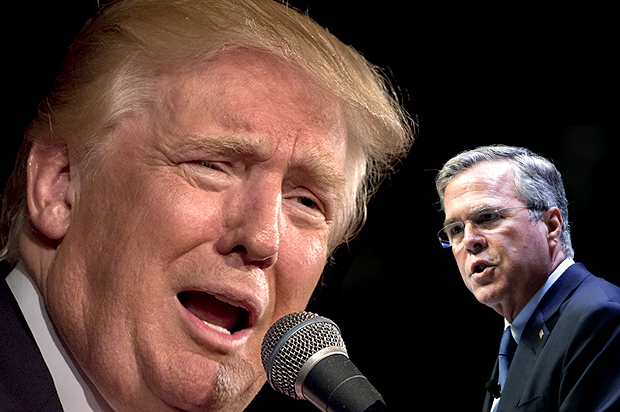We were promised “populism.” Donald Trump spent weeks and weeks foreshadowing a collision with traditional conservative and Republican economic policy, insisting that it was his intention to raise taxes on the wealthy as president. The fact that he wasn’t tanking in the polls while calling for the sacrosanct rich to face a higher tax bill was a real source of consternation for wealthy people and Republican insiders, who started to worry that Trump’s heretical views would force other candidates to follow his lead. There was a revolution a-brewin’ with 2016 Republican frontrunner Donald Trump threatening to do the unthinkable and [panicked gasp] raise his own taxes.
Turns out it was all bullshit. From Donald Trump! Who would have guessed?
Trump released the barebones details of his tax plan yesterday and the overall gist is that it’s extremely, hugely, tremendously, bigly great news for Donald Trump and his offspring. The plan pairs tax cuts with lower income people with massive tax cuts for wealthy people: he proposes dropping the top tax rate from 39.6 percent all the way down to 25 percent. It would cut taxes on business, cut taxes on investments, and eliminate the estate tax. The promise underlying all this enthusiastic slashing is that it will supercharge the economy and get it growing at roughly a million percent annually. And he’ll pay for all the lost revenue by closing various loopholes and eliminating certain deductions. It’s a very Donald Trump-ian plan – everything is big, everything is fantastic, so big and so fantastic you won’t believe it.
Or, rather, you can’t believe it because it’s all nonsense. “Rich people do not currently take enough tax deductions to offset the tax rate cuts Mr. Trump proposes,” Josh Barro notes in the New York Times. Using what limited information Trump provided, Citizens for Tax Justice projected that Trump’s tax plan will “cost more than $10 trillion in its first decade.”
Huge and irresponsible tax cuts for the rich? Massive deficits into the foreseeable future? Unsupported promises of wild economic growth? That’s not so much “populist” as it is… a standard Republican tax proposal. It’s so thoroughly within the boundaries of acceptable GOP tax policy that it got an approving thumbs-up from Grover Norquist.
What’s amazing, though, is that Trump spent so much time in the media spotlight posturing as a “populist” that he actually had a huge impact on how tax proposals from other Republican candidates were framed. When Jeb Bush released his tax plan, for example, it was viewed as a bid to steal some of Trump’s “populist” thunder. Jeb had been crumbling in the polls in the face of the Trump onslaught, and so he put out a plan that promised to end the carried interest loophole that Trump’s much-maligned “hedge fund guys” use to dodge taxation on certain portions of their income. Bush succeeded in convincing a number of reporters and pundits that he had embraced a “populist” worldview – “Jeb Bush’s populist tack on taxes finds echoes in unlikely sources,” declared a New York Times article.
It was all a mirage. As the Washington Post’s Matt O’Brien wrote last week, “at the same time [Jeb] would get rid of this unfairness” with the carried interest loophole, “he would actually dramatically cut taxes for most of those hedge fund guys.” That makes complete sense because everything about Jeb Bush’s economic philosophy revolves around the wisdom and necessity of cutting taxes for rich people. But people started calling him a “populist” because one line in his tax plan aligned with the fiery “populist” rhetoric of the most popular Republican candidate.
And when you hold Trump’s and Jeb’s tax plans side-by-side, they’re actually very similar, only Trump stayed true to his Jeb-antagonizing instincts and made his tax cuts even bigger. And his plan is in the same ballpark as Marco Rubio’s, which envisions lower individual rates, lower corporate taxes, and the elimination of taxes on investments and estates. No matter where you look in the Republican field, you’re going to find candidates with tax plans that prescribe huge cuts for the wealthy.
All the candidates are reading from the same standard-issue Republican playbook, but Trump’s outsized presence in the GOP field had the effect of creating this narrative of a “populist” undercurrent in 2016 Republican tax policy. Trump’s own policy has proven how silly that assumption was.


